-
 During his time at Oxford, a friend asked Paget Wilkes one day, “I say, Paget, do you tackle everyone who comes into your rooms about his soul?” “Yes,’ answered Paget, “if he comes in alone.” Wilkes was convinced that even the humblest Christian is responsible for bringing men to Christ. “If we have been forgiven and know it, if we have been made new creatures in Christ Jesus, then we…are commissioned to minister this same salvation unto men and to witness of all these things which Jesus our Savior has revealed to us. Hallelujah!” The primary need of the mission field today, as it was in Wilkes’ time, “is not for a highly educated and cultured pastorate, but for red-hot evangelists, filled with the Spirit and with the Word.” Join Wilkes as he expounds the living Christ from Scripture and reveals the power of the Holy Spirit to uphold and enable converts and evangelists alike.
During his time at Oxford, a friend asked Paget Wilkes one day, “I say, Paget, do you tackle everyone who comes into your rooms about his soul?” “Yes,’ answered Paget, “if he comes in alone.” Wilkes was convinced that even the humblest Christian is responsible for bringing men to Christ. “If we have been forgiven and know it, if we have been made new creatures in Christ Jesus, then we…are commissioned to minister this same salvation unto men and to witness of all these things which Jesus our Savior has revealed to us. Hallelujah!” The primary need of the mission field today, as it was in Wilkes’ time, “is not for a highly educated and cultured pastorate, but for red-hot evangelists, filled with the Spirit and with the Word.” Join Wilkes as he expounds the living Christ from Scripture and reveals the power of the Holy Spirit to uphold and enable converts and evangelists alike. -
 "Christ is kindest in His love when we are at our weakest." - Samuel Rutherford When we read The Loveliness of Christ, it is as though a curtain is raised for us, enabling us to observe a man so taken up with his Lord that we want to kneel with him. It is not a book to read straight through, but to graze in, appropriating what we need, going back during a trial and seeing what we missed on our first reading. It is a book to mark in with “so true,” and, “Lord, let it be my experience too.”
"Christ is kindest in His love when we are at our weakest." - Samuel Rutherford When we read The Loveliness of Christ, it is as though a curtain is raised for us, enabling us to observe a man so taken up with his Lord that we want to kneel with him. It is not a book to read straight through, but to graze in, appropriating what we need, going back during a trial and seeing what we missed on our first reading. It is a book to mark in with “so true,” and, “Lord, let it be my experience too.” -
 “The unity of the Body is one of the most forceful apologetics for the divinity of Christ. Conversely, disunity is Satan’s most successful tool.” – Otto Helweg
“The unity of the Body is one of the most forceful apologetics for the divinity of Christ. Conversely, disunity is Satan’s most successful tool.” – Otto HelwegGod’s glory in us is the basic provision for Christian unity. “I have given them the glory that you gave me, that they may be one as we are one: I in them and you in me. May they be brought to complete unity to let the world know that you sent me and have loved them even as you have loved me” (John 17:20-23).
The primary assumption in this book is the authority and inspiration of the Scriptures. There are promises, prayers, and commands in the New Testament concerning the church’s unity in Christ. The Christian church is made up of individual members of the body of Christ. This book is written to those individuals. The church as a whole cannot obey God. Only the parts can.
Have an Audible subscription? This title is also available on Audible here. -
 Mr. Trumbull reveals tremendous insight into the full reality of the victory we have in Christ. He uplifts the Lord Jesus Christ, pointing to Him as the Victor who has achieved victory by the power of His divine life and His finished work on the Cross. If you want to live a victorious, joyful Christian life, this book is for you.
Mr. Trumbull reveals tremendous insight into the full reality of the victory we have in Christ. He uplifts the Lord Jesus Christ, pointing to Him as the Victor who has achieved victory by the power of His divine life and His finished work on the Cross. If you want to live a victorious, joyful Christian life, this book is for you. -
 Does revival come only in great soul-shaking outpourings of the Spirit? "NO!" says Norman Grubb. Revival is within reach of everyday people and can be experienced in your heart, home, and church. Follow the author as he takes you through his experiences and the effect on his life of the brokenness and ongoing personal revival he found as a result of his exposure to the revival movement in Rwanda, East Africa in 1950. Learn the working secret which brought continuous revival to thousands over a period of sixteen years. Read this book and let the Reviver do His work in you.
Does revival come only in great soul-shaking outpourings of the Spirit? "NO!" says Norman Grubb. Revival is within reach of everyday people and can be experienced in your heart, home, and church. Follow the author as he takes you through his experiences and the effect on his life of the brokenness and ongoing personal revival he found as a result of his exposure to the revival movement in Rwanda, East Africa in 1950. Learn the working secret which brought continuous revival to thousands over a period of sixteen years. Read this book and let the Reviver do His work in you. -
 Roy Hession, a successful evangelist in England, knew he had lost the power of the Spirit in his life - a terrible feeling as he led his evangelistic campaigns. In 1947, Hession met leaders of the East African Church which was then experiencing a sweeping revival, and recognized his deep personal need. It was like starting the Christian life over as he came humbly to the Cross. The principles which the Lord taught him were first published in 1950 as The Calvary Road and are now available in over 70 languages. Do you long for revival and power in your life? Learn how Jesus can fill you with His spirit through brokenness, repentance and confession in this updated version of Hession’s classic work.
Roy Hession, a successful evangelist in England, knew he had lost the power of the Spirit in his life - a terrible feeling as he led his evangelistic campaigns. In 1947, Hession met leaders of the East African Church which was then experiencing a sweeping revival, and recognized his deep personal need. It was like starting the Christian life over as he came humbly to the Cross. The principles which the Lord taught him were first published in 1950 as The Calvary Road and are now available in over 70 languages. Do you long for revival and power in your life? Learn how Jesus can fill you with His spirit through brokenness, repentance and confession in this updated version of Hession’s classic work. -
 In a world of dysfunctional families, churches, and societies, professional counseling is in great demand as a solution to our problems. The weak link in this solution is the inability to determine a counselor’s qualifications apart from his professional accreditation. Academics can give you knowledge, but no learning or books can give you wisdom. There are no graduate degrees in love or compassion. You cannot get a PhD in virtue. However, these things are available to everyone freely through Christ. Counseling needs knowledge, but it needs wisdom even more. Wisdom comes from the Bible, from age and experience, from answered prayer. “If any of you lacks wisdom, you should ask God, who gives generously to all without finding fault, and it will be given to you” (James 1:5). As Christians, our objective is to bring others up to maturity in Christ. To do this, we must have the same qualifications Paul had (the wisdom, the holiness, and the love). This book is for counselors and all Christians as they work “to present everyone perfect in Christ” (Col. 1:28). In Wisdom, Not Knowledge, Jim Wilson shares what he has learned from the Bible, personal experience, and answered prayer in more than six decades of counseling. With chapters on comforting, exhorting, rebuking, forgiving, and prayer as well as treatments of special subjects such as depression, false guilt, and self-esteem, this book is a great resource for any counselor, whether you're a professional or just trying to help a friend. Not a counselor? Learn how to grow in Christ and discover solutions to your own problems as you apply the wisdom in these chapters to your life.
In a world of dysfunctional families, churches, and societies, professional counseling is in great demand as a solution to our problems. The weak link in this solution is the inability to determine a counselor’s qualifications apart from his professional accreditation. Academics can give you knowledge, but no learning or books can give you wisdom. There are no graduate degrees in love or compassion. You cannot get a PhD in virtue. However, these things are available to everyone freely through Christ. Counseling needs knowledge, but it needs wisdom even more. Wisdom comes from the Bible, from age and experience, from answered prayer. “If any of you lacks wisdom, you should ask God, who gives generously to all without finding fault, and it will be given to you” (James 1:5). As Christians, our objective is to bring others up to maturity in Christ. To do this, we must have the same qualifications Paul had (the wisdom, the holiness, and the love). This book is for counselors and all Christians as they work “to present everyone perfect in Christ” (Col. 1:28). In Wisdom, Not Knowledge, Jim Wilson shares what he has learned from the Bible, personal experience, and answered prayer in more than six decades of counseling. With chapters on comforting, exhorting, rebuking, forgiving, and prayer as well as treatments of special subjects such as depression, false guilt, and self-esteem, this book is a great resource for any counselor, whether you're a professional or just trying to help a friend. Not a counselor? Learn how to grow in Christ and discover solutions to your own problems as you apply the wisdom in these chapters to your life. -
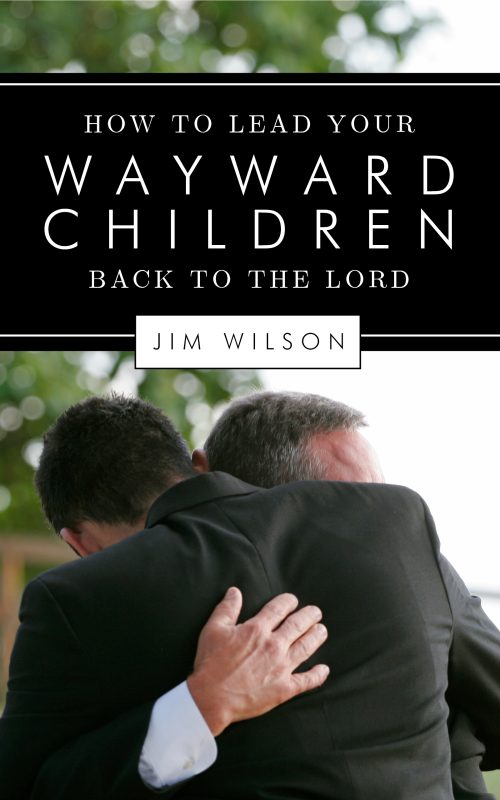 You love God. You love your kids. So why don’t they love Him? God promises lovingkindness to a thousand generations for families who love and obey Him (Deut. 7:9). Why are children who grew up in Christian homes leaving the faith, and how do we get them to come back? No matter how old your children are, there is a solution. With decades of pastoral wisdom, Jim Wilson identifies the common causes of rebellion and helps parents apply the eternal truths of Scripture to “turn the hearts of the parents to their children and the disobedient to the wisdom of the righteous—to make ready a people prepared for the Lord” (Luke 1:17).
You love God. You love your kids. So why don’t they love Him? God promises lovingkindness to a thousand generations for families who love and obey Him (Deut. 7:9). Why are children who grew up in Christian homes leaving the faith, and how do we get them to come back? No matter how old your children are, there is a solution. With decades of pastoral wisdom, Jim Wilson identifies the common causes of rebellion and helps parents apply the eternal truths of Scripture to “turn the hearts of the parents to their children and the disobedient to the wisdom of the righteous—to make ready a people prepared for the Lord” (Luke 1:17).
-
 Insist that Christ is Lord, and you divide the world. While most societies acknowledge God in some way or another, Christ as Lord is not so universally honored. For Christians, this matter should be settled. Christ is Lord and Savior — but many Christians have little or no idea of the meaning of this simple statement or its implications for our day-to-day lives. Sixty years after its first publication, the message of The Lordship of Jesus Christ is still needed. “In words of gentle, yet pointed, rebuke, Christ turned to His disciples with the very pertinent question, ‘Why call ye me, Lord, Lord, and do not the things which I say?’ (Luke 6:46). Holiness is not correct Christian phraseology, but an unreserved commitment to unquestioning obedience to whatever the Lord requires.” – Bill Pape, The Lordship of Jesus Christ Have an Audible subscription? This title is also available on Audible here.
Insist that Christ is Lord, and you divide the world. While most societies acknowledge God in some way or another, Christ as Lord is not so universally honored. For Christians, this matter should be settled. Christ is Lord and Savior — but many Christians have little or no idea of the meaning of this simple statement or its implications for our day-to-day lives. Sixty years after its first publication, the message of The Lordship of Jesus Christ is still needed. “In words of gentle, yet pointed, rebuke, Christ turned to His disciples with the very pertinent question, ‘Why call ye me, Lord, Lord, and do not the things which I say?’ (Luke 6:46). Holiness is not correct Christian phraseology, but an unreserved commitment to unquestioning obedience to whatever the Lord requires.” – Bill Pape, The Lordship of Jesus Christ Have an Audible subscription? This title is also available on Audible here. -
 What does it mean to be faithful? How do you define success? Can you be a career naval officer and a Christian? In The USNA 12, graduates of the U.S. Naval Academy tell stories of their time at the Academy and how the experiences they had there transformed their lives. We trust that these stories will be a blessing to you and that this will be an example for similar books from each of the service academies in future years. “To them God has chosen to make known among the Gentiles the glorious riches of this mystery, which is Christ in you, the hope of glory. He is the one we proclaim, admonishing and teaching everyone with all wisdom, so that we may present everyone fully mature in Christ.” (Col. 1:27-28)
What does it mean to be faithful? How do you define success? Can you be a career naval officer and a Christian? In The USNA 12, graduates of the U.S. Naval Academy tell stories of their time at the Academy and how the experiences they had there transformed their lives. We trust that these stories will be a blessing to you and that this will be an example for similar books from each of the service academies in future years. “To them God has chosen to make known among the Gentiles the glorious riches of this mystery, which is Christ in you, the hope of glory. He is the one we proclaim, admonishing and teaching everyone with all wisdom, so that we may present everyone fully mature in Christ.” (Col. 1:27-28)
-
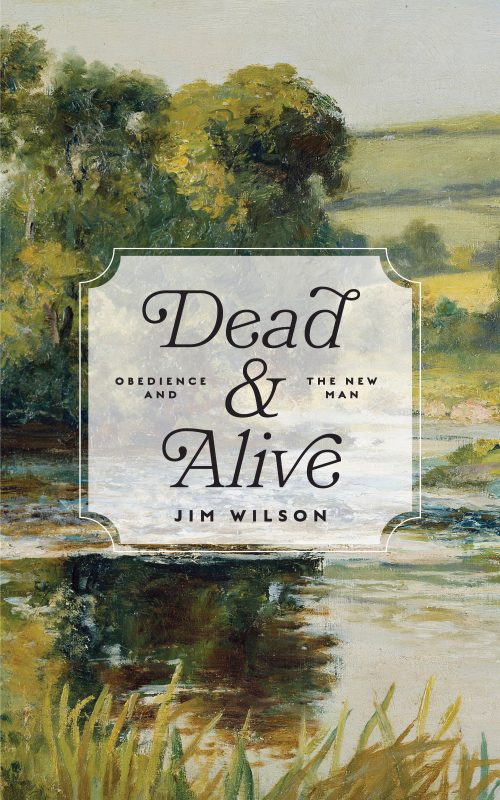 Disobedience. It’s normal, right? For hundreds of years, the Church has struggled with how to overcome sin in the Christian life. We know that the cross takes care of our past sins at salvation and assures us life after death. But what do we do with the time in between? Many Christians go through life sinning and confessing, sinning and confessing, but they never get beyond that. Is that better than sinning and not confessing? Absolutely: but it is not enough if you want to grow. Contrary to most evangelical teaching today, Christian obedience is meant to be glad-hearted, willing, and normal. In Dead and Alive, Jim Wilson discusses the neglected requirement of obedience and explains God’s provision for it from Scripture. May the thoughts in it lead you into a victorious, obedient life in Christ. "But just as he who called you is holy, so be holy in all you do; for it is written: 'Be holy, because I am holy.'” (1 Pet. 1:15–16) Have an Audible subscription? This title is also available on Audible here.
Disobedience. It’s normal, right? For hundreds of years, the Church has struggled with how to overcome sin in the Christian life. We know that the cross takes care of our past sins at salvation and assures us life after death. But what do we do with the time in between? Many Christians go through life sinning and confessing, sinning and confessing, but they never get beyond that. Is that better than sinning and not confessing? Absolutely: but it is not enough if you want to grow. Contrary to most evangelical teaching today, Christian obedience is meant to be glad-hearted, willing, and normal. In Dead and Alive, Jim Wilson discusses the neglected requirement of obedience and explains God’s provision for it from Scripture. May the thoughts in it lead you into a victorious, obedient life in Christ. "But just as he who called you is holy, so be holy in all you do; for it is written: 'Be holy, because I am holy.'” (1 Pet. 1:15–16) Have an Audible subscription? This title is also available on Audible here. -

Men were designed, created, and commanded to bear responsibility, but our history of failure in this area stretches all the way back to Adam. Today irresponsibility is considered normal, even a birthright. Jim Wilson outlines the causes and results of this failure, the biblical principles and characteristics that define a responsible man, and how men can apply them both in their own lives and in raising their sons.
Masculinity does not have to be proved with muscularity, sexual prowess, or bragging. True masculinity is established by taking up the responsibility God has given you.
-
 Bitterness often grows out of a small offense - perhaps a passing word, an accidental shove, or a pair of dirty socks left in the middle of the living room floor. Yet when bitterness takes root in our hearts, its effects are anything but small. In this collection of short articles, Jim Wilson and others discuss what it means to live as "imitators of God." As the Apostle Paul says in Ephesians, we have been called to leave the bitterness and anger of the world and instead embrace the love and compassion of our God. The authors remind us that we are to forgive others just as we have been forgiven, pointing to Scriptural admonitions and examples as they offer sound teaching on the trials and temptations of everyday life. Have an Audible account? Get this title on Audible here. Did you know we give away more copies of How to Be Free from Bitterness than we sell? These copies are paid for entirely by donations. Have you been blessed by this booklet? You can help fund copies for someone else by making a tax-deductible gift to the literature fund here.
Bitterness often grows out of a small offense - perhaps a passing word, an accidental shove, or a pair of dirty socks left in the middle of the living room floor. Yet when bitterness takes root in our hearts, its effects are anything but small. In this collection of short articles, Jim Wilson and others discuss what it means to live as "imitators of God." As the Apostle Paul says in Ephesians, we have been called to leave the bitterness and anger of the world and instead embrace the love and compassion of our God. The authors remind us that we are to forgive others just as we have been forgiven, pointing to Scriptural admonitions and examples as they offer sound teaching on the trials and temptations of everyday life. Have an Audible account? Get this title on Audible here. Did you know we give away more copies of How to Be Free from Bitterness than we sell? These copies are paid for entirely by donations. Have you been blessed by this booklet? You can help fund copies for someone else by making a tax-deductible gift to the literature fund here. -
 “Revolutionary love” sounds like an oxymoron. Revolution is usually a negative, violent, and destructive change, while love is positive, peaceful, and contented. But true love always changes people. And Christ’s love brings the most revolutionary change of all. Festo Kivengere (1919–88) experienced both kinds of revolution. He escaped Uganda when the brutal regime of Idi Amin seized power. But he could not escape the pursuit of Jesus, who came into his life with radically transformative grace. In Revolutionary Love, Kivengere tells his story of learning to freely receive Christ’s love and freely share it with others. Have an Audible subscription? You can also get this title on Audible here.
“Revolutionary love” sounds like an oxymoron. Revolution is usually a negative, violent, and destructive change, while love is positive, peaceful, and contented. But true love always changes people. And Christ’s love brings the most revolutionary change of all. Festo Kivengere (1919–88) experienced both kinds of revolution. He escaped Uganda when the brutal regime of Idi Amin seized power. But he could not escape the pursuit of Jesus, who came into his life with radically transformative grace. In Revolutionary Love, Kivengere tells his story of learning to freely receive Christ’s love and freely share it with others. Have an Audible subscription? You can also get this title on Audible here. -
 New Devotional Readings - Who We Are & What We Do in Christ Being Christian has St. Paul's ambitious goal: to present every person perfect in Christ. With that in mind, this wide-ranging devotional is full of strong texts and short teaching, all organized into bite-size readings. You will find applicable wisdom on every page, as Being Christian is the product of Jim Wilson's practical advice and scriptural meditation over the past thirty-five years. Throughout every chapter you will read a huge variety of powerful, concentrated Scriptures, covering fundamental topics like prayer, evangelism, everyday holiness, joy, love, family, and (of course) what it means to be a Christian. "Strong teaching makes strong Christians. And it makes soft-hearted, tender, loving Christians. But soft teaching makes hard, callused Christians. Soft teaching is for people who have itching ears. They do not wish to have their lives interfered with." ~ JIM WILSON, from the preface
New Devotional Readings - Who We Are & What We Do in Christ Being Christian has St. Paul's ambitious goal: to present every person perfect in Christ. With that in mind, this wide-ranging devotional is full of strong texts and short teaching, all organized into bite-size readings. You will find applicable wisdom on every page, as Being Christian is the product of Jim Wilson's practical advice and scriptural meditation over the past thirty-five years. Throughout every chapter you will read a huge variety of powerful, concentrated Scriptures, covering fundamental topics like prayer, evangelism, everyday holiness, joy, love, family, and (of course) what it means to be a Christian. "Strong teaching makes strong Christians. And it makes soft-hearted, tender, loving Christians. But soft teaching makes hard, callused Christians. Soft teaching is for people who have itching ears. They do not wish to have their lives interfered with." ~ JIM WILSON, from the preface -
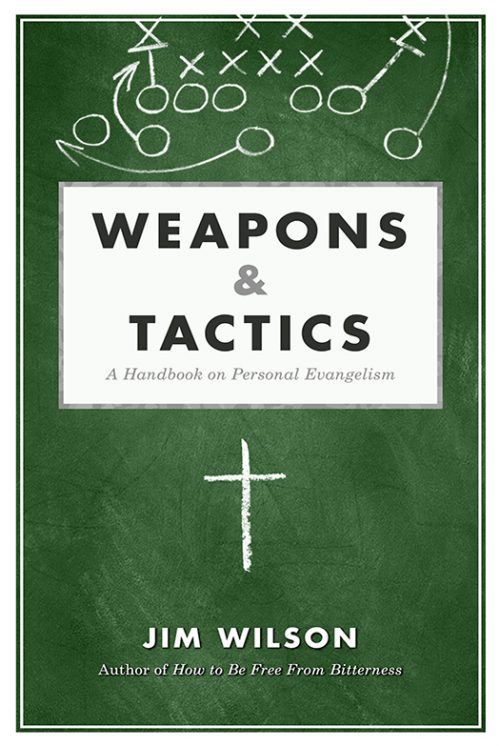 A Handbook on Personal Evangelism Even if communities understand how to follow the principles of spiritual warfare, the actually winning of souls usually occurs on the personal level. Big-picture evangelistic strategy must be complemented by an understanding of personal evangelism. Weapons & Tactics teaches individual Christians how to apply the evangelistic principles described in Principles of War. Using thorough analysis of Scripture and real-life examples, Jim Wilson provides insight on spiritual weapons (what God has given us to fight with) and tactics (the effective use of those weapons) with simple, powerful language. Weapons & Tactics calls us to personal, life-changing obedience as we follow our captain in the fight.
A Handbook on Personal Evangelism Even if communities understand how to follow the principles of spiritual warfare, the actually winning of souls usually occurs on the personal level. Big-picture evangelistic strategy must be complemented by an understanding of personal evangelism. Weapons & Tactics teaches individual Christians how to apply the evangelistic principles described in Principles of War. Using thorough analysis of Scripture and real-life examples, Jim Wilson provides insight on spiritual weapons (what God has given us to fight with) and tactics (the effective use of those weapons) with simple, powerful language. Weapons & Tactics calls us to personal, life-changing obedience as we follow our captain in the fight. -
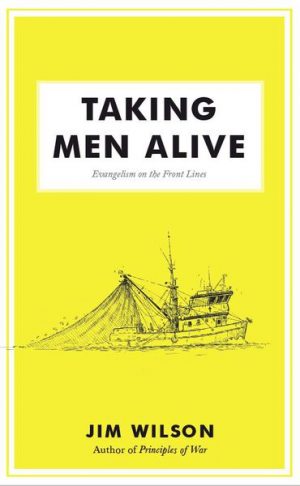 Evangelism on the Front Lines Coming from decades of faithful witnessing as a pastor, a U.S. Navy officer, and a door-to-door evangelist, Taking Men Alive shares Jim Wilson's extensive wisdom on evangelism. Jim's insights have been gleaned from a huge variety of personal interactions and straightforward (yet surprising) exegesis of biblical accounts of evangelism. Entertaining and intensely practical, Taking Men Alive is an inspiring evangelistic meditation and powerful handbook for determining what spiritual state your neighbor is in and how you should approach taking his heart for the Lord Jesus Christ.
Evangelism on the Front Lines Coming from decades of faithful witnessing as a pastor, a U.S. Navy officer, and a door-to-door evangelist, Taking Men Alive shares Jim Wilson's extensive wisdom on evangelism. Jim's insights have been gleaned from a huge variety of personal interactions and straightforward (yet surprising) exegesis of biblical accounts of evangelism. Entertaining and intensely practical, Taking Men Alive is an inspiring evangelistic meditation and powerful handbook for determining what spiritual state your neighbor is in and how you should approach taking his heart for the Lord Jesus Christ.
-
 We love our kids, but do we love like God loves....without conditions, reservations, or reluctance? In this excerpt from his popular book How to be Free from Bitterness, Jim Wilson identifies the troublesome consequences of insufficient parental love and points readers to the glorious fruit of superabundant kindness, and patience and helps parents apply the eternal truths of Scripture to grow peace and joy in their homes.
We love our kids, but do we love like God loves....without conditions, reservations, or reluctance? In this excerpt from his popular book How to be Free from Bitterness, Jim Wilson identifies the troublesome consequences of insufficient parental love and points readers to the glorious fruit of superabundant kindness, and patience and helps parents apply the eternal truths of Scripture to grow peace and joy in their homes.
-
 “Oh, the depth of the riches and wisdom and knowledge of God!” (Rom. 11:33). Our heavenly Father has given us unfathomable blessings, but we often fail to live as if they are truly ours. In thankfulness and Confession, Brad Scheelke encourages readers to meditate on and rejoice in the glorious riches of our inheritance in Christ. As we regularly give thanks for what God has given us, our thoughts and actions will begin to change . . . often in surprising ways. Gratitude also changes how we deal with sin. When we confess our sin, bringing it into the light of Christ’s riches, we now see not only the darkness of our own evil, but also the beauty of God’s holiness and grace. When we learn to practice thankfulness and confession in this way, our hearts will overflow in joy, in love for one another, and in glory to God.
“Oh, the depth of the riches and wisdom and knowledge of God!” (Rom. 11:33). Our heavenly Father has given us unfathomable blessings, but we often fail to live as if they are truly ours. In thankfulness and Confession, Brad Scheelke encourages readers to meditate on and rejoice in the glorious riches of our inheritance in Christ. As we regularly give thanks for what God has given us, our thoughts and actions will begin to change . . . often in surprising ways. Gratitude also changes how we deal with sin. When we confess our sin, bringing it into the light of Christ’s riches, we now see not only the darkness of our own evil, but also the beauty of God’s holiness and grace. When we learn to practice thankfulness and confession in this way, our hearts will overflow in joy, in love for one another, and in glory to God. -
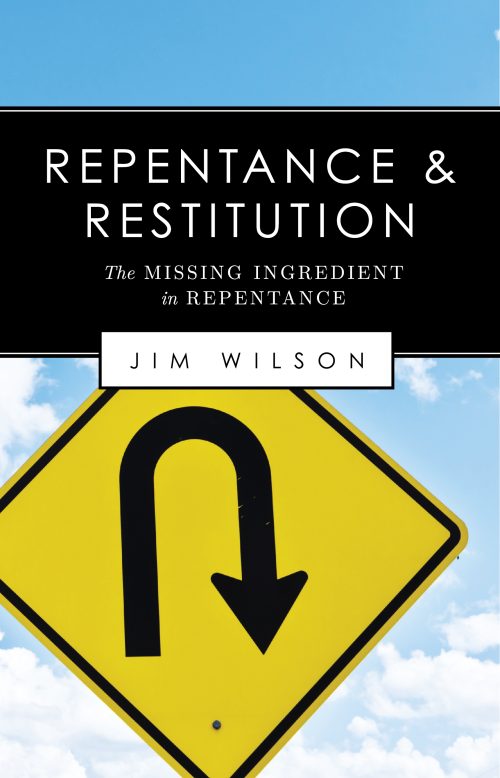 Jesus’ death paid for our sins - the guilt, the death, and the punishment. Jesus does not repay the man who got ripped off when we stole from him. According to the Bible, the person who comes to the Lord in repentance is to pay the one he stole from the value of the stolen goods plus one fifth of the value. But what if it is a candy bar you took twenty years ago? The amount stolen and the time since the theft do not make it yours. There are many Christians who are living subnormal Christian lives because they are too proud or too afraid to make restitution. They are like people with low-grade fevers; they are not sick enough to be in bed, but too sick to do anything worthwhile. Even if no one knows about the thefts, these Christians are poor witnesses for Jesus Christ. They may have confessed and repented in words, but if they do not make restitution, it is not true repentance, and they are not forgiven.
Jesus’ death paid for our sins - the guilt, the death, and the punishment. Jesus does not repay the man who got ripped off when we stole from him. According to the Bible, the person who comes to the Lord in repentance is to pay the one he stole from the value of the stolen goods plus one fifth of the value. But what if it is a candy bar you took twenty years ago? The amount stolen and the time since the theft do not make it yours. There are many Christians who are living subnormal Christian lives because they are too proud or too afraid to make restitution. They are like people with low-grade fevers; they are not sick enough to be in bed, but too sick to do anything worthwhile. Even if no one knows about the thefts, these Christians are poor witnesses for Jesus Christ. They may have confessed and repented in words, but if they do not make restitution, it is not true repentance, and they are not forgiven. -
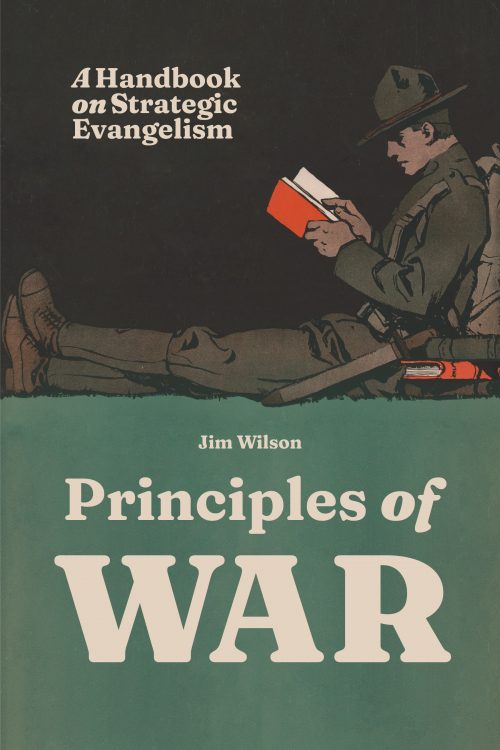
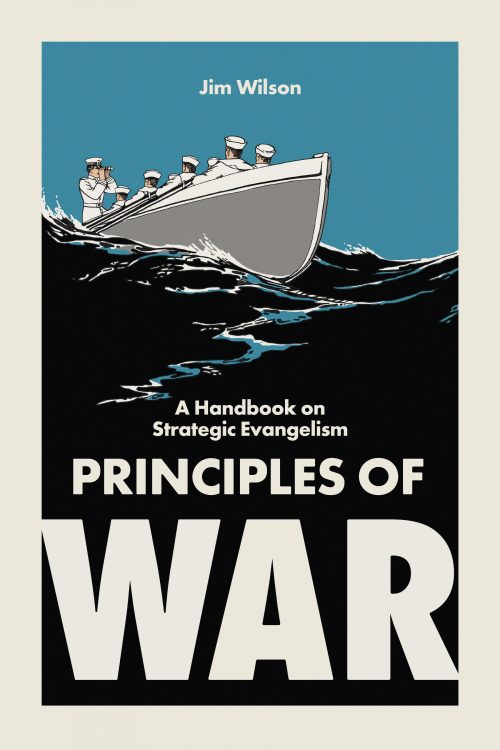 In the study of warfare, great men have concluded that there are some overriding principles which, if followed, will always tend toward success in battle, and if neglected or ignored, will tend toward defeat or even destruction. These principles have been entitled the "principles of war." But not all warfare is waged on a battlefield: every Christian is called to be a soldier. Our fight is against Satan, our objective is the acknowledgment and fulfillment of God's commands, and our ammunition is the power of the Holy Spirit. In Principles of War, Jim Wilson outlines the time-tried, fundamental principles of war and explains how we can employ them in our daily spiritual battles as we fight a war which our commander in chief has already won for us.
In the study of warfare, great men have concluded that there are some overriding principles which, if followed, will always tend toward success in battle, and if neglected or ignored, will tend toward defeat or even destruction. These principles have been entitled the "principles of war." But not all warfare is waged on a battlefield: every Christian is called to be a soldier. Our fight is against Satan, our objective is the acknowledgment and fulfillment of God's commands, and our ammunition is the power of the Holy Spirit. In Principles of War, Jim Wilson outlines the time-tried, fundamental principles of war and explains how we can employ them in our daily spiritual battles as we fight a war which our commander in chief has already won for us. -
 Vincit qui se vincit“He conquers who conquers himself.”Is it ok to be in the military and be moral? The answer is yes. In the early 1950s, my ship left San Diego for the Western Pacific. We had eighteen “boots” aboard. The captain decided that these young men needed to be protected, and should be informed of the facts of life. It was a three-pronged effort. The exec talked to the men in a fatherly sort of way about their mothers, their sisters, their hometown girlfriends, and their wives. This nostalgia was to protect them from waywardness. An “assigned” chaplain talked with them about absolute morality and sin. And finally, the medical officer and the corpsman taught them about condoms and “past event cleansing.” ... The training had left out the effects of peer pressure... This essay was first written for the U.S. Naval Institute Prize Essay Contest. Because of the gross moral lapses in the U.S. military in the last few decades, I thought I should prepare it for distribution to our future leaders. It is dedicated to the future military leadership of the United States. - James I. Wilson
Vincit qui se vincit“He conquers who conquers himself.”Is it ok to be in the military and be moral? The answer is yes. In the early 1950s, my ship left San Diego for the Western Pacific. We had eighteen “boots” aboard. The captain decided that these young men needed to be protected, and should be informed of the facts of life. It was a three-pronged effort. The exec talked to the men in a fatherly sort of way about their mothers, their sisters, their hometown girlfriends, and their wives. This nostalgia was to protect them from waywardness. An “assigned” chaplain talked with them about absolute morality and sin. And finally, the medical officer and the corpsman taught them about condoms and “past event cleansing.” ... The training had left out the effects of peer pressure... This essay was first written for the U.S. Naval Institute Prize Essay Contest. Because of the gross moral lapses in the U.S. military in the last few decades, I thought I should prepare it for distribution to our future leaders. It is dedicated to the future military leadership of the United States. - James I. Wilson


